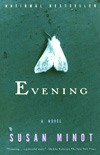
Comment
on this story
|
 |

On tropical storms and hypnotic prose
by Jeanne McDonald
It didn't matter that we had spent $1,300 to rent an oceanfront beach house at Pawley's Island and it rained for the first three days. It didn't matter that the capricious tropical storm Edouard was nosing around the Georgia and Florida coasts, trying to decide whether to move north and finish us off once and for all. What mattered most were those three rainy days I spent with Ann Grant, learning about her disappointing marriages, the tragic loss of a child, and the single unforgettable weekend she spent with Harris Arden, a man whose brief passion sustained her love for over 40 years.
Occasionally, especially if you are a writer, you read a book that you wish you had written  yourself, a book that stays with you even after you turn the very last page. That's what happened when I read Susan Minot's novel Evening (Knopf, $12). The protagonist is 65-year-old Ann Grant, who, though she is dying of cancer and drifting back and forth through the milky membranes of the conscious and unconscious worlds, remembers her past with utmost clarity. Debilitated by pain and morphine, she floats in and out of her lifelong experiences, often speaking aloud to the characters brought back for encores on the enormous stage of her vivid memory. yourself, a book that stays with you even after you turn the very last page. That's what happened when I read Susan Minot's novel Evening (Knopf, $12). The protagonist is 65-year-old Ann Grant, who, though she is dying of cancer and drifting back and forth through the milky membranes of the conscious and unconscious worlds, remembers her past with utmost clarity. Debilitated by pain and morphine, she floats in and out of her lifelong experiences, often speaking aloud to the characters brought back for encores on the enormous stage of her vivid memory.
Minot begins her book with a quote from Faulkner: "I give it to you not that you may remember time, but that you might forget it now and then for a moment and not spend all your breath trying to conquer it." In an interview in Bold Type, a Random House online literary web site, the author says that "...[T]he attempt to conquer the past is just another battle one has with time, and a losing one.... Memory, that activity of the mind and heart which both gives meaning to life and pulls us back from it...determines the way we narrate our lives—our experience is stored there—but it is never stored in one mind like another. Memory is another example of the isolation of individuals—each has his or her own, it can never be shared exactly."
As Ann's three children by different husbands wait downstairs on their death watch, their own remembrances of the past often conflict with their mother's. And although we want to believe that Ann's monumental love for Harris Arden was returned in kind, we begin to understand that it might not have been exactly as she recalls it in her feverish daydreams. Ultimately, on her deathbed she watches herself swimming through the yellow dawn and a wave that curls up beside her says "I am here swimming up from this sea beside you I am here I have always been here...your true self...and though you thought it came from him it was really your whole self entire swimming underwater all the time there beside you."
Her children have never heard their mother mention Harris Arden, but in her delirium, Ann finally speaks his name aloud. Eventually, through Ann's memories and hallucinations, we begin to suspect that, like the lovers in Minot's newest book, Rapture, Ann and Harris must have had completely different perspectives on the same mutual experience. But whatever intuitions Ann has she holds close to her heart, keeping her secrets from others because that way she can save them only for herself.
Evening is a gorgeous book, seamlessly written, passionate, riveting, and erotic. To be able to write a five-page seduction scene without a single tasteless word or phrase, as Minot does in this book, is the mark of a brilliant and lyrical writer.
The plot concentrates on the weekend of a wedding on an island in Maine, where Ann and Harris, members of the wedding party, meet for the very first time. Their coming together is tantalizingly slow and mesmerizing, a sort of intellectual foreplay that quickly becomes physical: "[T]he sensation came over her slowly that something important was happening, there was a decidedly new quality to everything around her, things were sharper and brighter, the air amplified sound." As the nuptial activities unfold, Minot introduces us to a dozen other characters who contribute to the narrative's central love story.
This is an artistic novel, almost poetic in its language, and even though we know at the beginning that Ann will die, the ending is strangely comforting: "And she began to let go, she let go of the soaked grass and the humped hills and the headlights sweeping the driveway...she released his collar and his sleeve...and let go of the stars which had been too bright and the pale black sky and dropped like a stone the sight of him leaving. She let go of it all."
And the reader, too, must finally let go of Ann Grant and her story, no matter how painful that letting go might be.

October 3, 2002 * Vol. 12, No. 40
© 2002 Metro Pulse
|